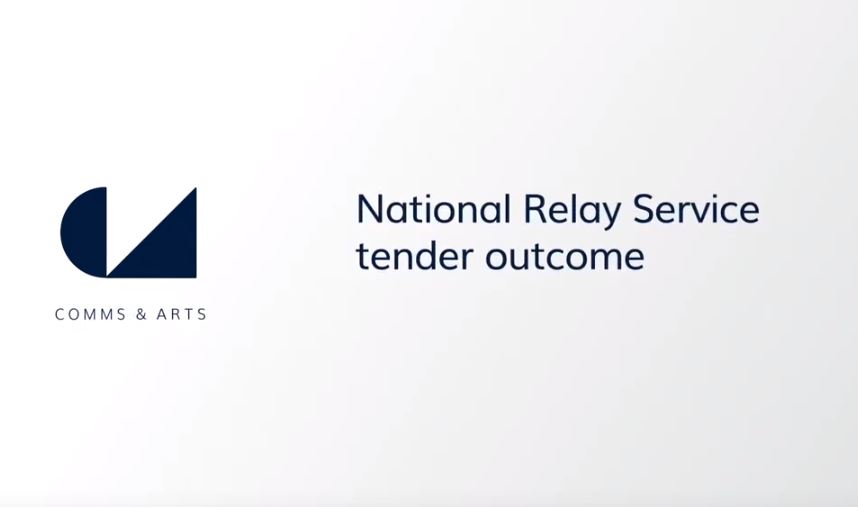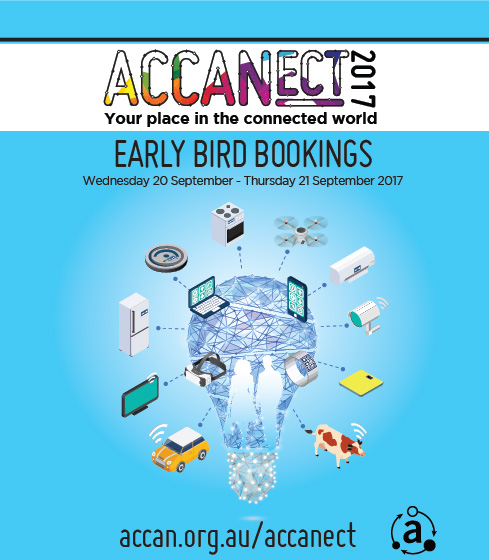Key Dates
Next Grant Round:
Applications for funding will open early 2025.
> Information about our Grants Program
Independent Grants Panel:
Results of the recent EOI will be notified Dec 2024.
> Information about our Panel
We can help: grants@accan.org.au
or phone 02 9288 4000
Subscribe to Grants Program mailings
In June we were very excited to sign a new funding contract with the Department of Communications and the Arts. The new contract ensures that ACCAN will continue to represent consumers in the telecommunications industry for the next five years.
When the contract was signed, ACCAN CEO, Teresa Corbin said: “The recent ACCAN review highlighted the strong support for the work ACCAN does and many stakeholders reinforced the need for a united consumer voice in the telecommunications industry.
“A big thank you must go to ACCAN’s supporters including members, volunteers and industry representatives for their ongoing commitment to ensuring we remain a relevant and effective organisation.”
Read more: Five years of ACCAN consumer wins
Write comment (0 Comments)Australia’s peak communications consumer advocacy group, the Australian Communications Consumer Action Network (ACCAN), has today announced the seven successful projects that it will fund through the 2019 Round of the ACCAN Grants Program.
The ACCAN Grants Program funds projects to undertake research on telecommunications issues, represent telecommunications consumers, and create educational tools which empower consumers to understand telecommunications products and services and make decisions in their own interests.
ACCAN responded to the Government’s 2023 Privacy Act consultation. The consultation report offered a number of proposals resulting from the 2022 Privacy Act Review consultation.
in general, ACCAN was pleased with the majority of the proposals in the report.
 In the past five years, a total of $1,256,055.86 has been awarded to universities, research organisations, community groups and not for profit organisations to help consumers navigate the telecommunications and technology landscape.
In the past five years, a total of $1,256,055.86 has been awarded to universities, research organisations, community groups and not for profit organisations to help consumers navigate the telecommunications and technology landscape.
The ACCAN Grants Scheme has funded 31 different projects since 2012, examining emerging technologies like 3D printing, through to more serious consumer issues, such as technology facilitated stalking and abuse.
Read more: In the field – ACCAN Grants Scheme 2012-17
Write comment (0 Comments)As Australia’s consumer voice on phone and internet issues, the Australian Communications Consumer Action Network (ACCAN) has welcomed NBN Co’s recently announced Wholesale Pricing Review Consultation Paper.
ACCAN has strongly championed the need for affordable home broadband in Australia. High-cost broadband services make accessing important education, employment, health and government services very difficult for our communities.
ACCAN recently submitted to the Office for Women consultation on the National Strategy to Achieve Gender Equality (the strategy). In our submission we recommended the Office for Women consider gendered violence arising from technology-facilitated abuse as a vital component of the strategy.
Read more: National Strategy to Achieve Gender Equality consultation
 Have you noticed how more and more everyday items are now connected to the internet?
Have you noticed how more and more everyday items are now connected to the internet?
While we used to have ordinary watches that told us the time and the date, we now have smartwatches that track our fitness, alert us about emails and more.
Read more: Explore the connected world at ACCANect 2017
Write comment (0 Comments)
The NRS allows Australians who are Deaf or have hearing or speech impairment to access telecommunications services through the phone, web or teletypewriter (TTY). It is a vital service that allows its users to communicate for work, socially, and in emergencies.
“All Australians deserve the right to reliable communications whether they access it through traditional telco technology or through the NRS,” said ACCAN CEO, Teresa Corbin.
Read more: ACCAN welcomes appointment of NRS service provider
ACCAN has recently submitted to the Parliament of Australia’s Senate Select Committee on the Cost of Living. ACCAN’s submission outlined the impact of the increasing cost of broadband services on consumers, and how consumers have adapted to these rising costs. Small increases to the cost of telecommunications services can have a significant detrimental impact on the financial wellbeing of low-income consumers.
ACCAN recommends addressing the increasing cost of telecommunications by establishing:
With the Federal Election campaign now over, ACCAN congratulates Senator the Hon Mitch Fifield and Senator the Hon Fiona Nash who continue in their roles as Minister for Communications and Minister for Regional Communications respectively for the Turnbull Government. The Federal Member for Greenway, the Hon Michelle Rowland MP and the Federal Member for Throsby – Stephen Jones take up the roles of Shadow Minister for Communications and Shadow Minister for Regional Communications respectively.
We are pleased that during their campaigns both the Coalition and Labor made announcements of an additional $60 million in funding for a third round of the Mobile Black Spots Programme. This is vital as mobile coverage and competition in rural areas continues to be is a key issue for many consumers.
In the lead up to the election, ACCAN called for the parties to focus on five communications consumer priorities and we asked them a series of questions based on these priorities. We covered announcements from the Coalition, Labor and the Australian Greens on NBN policy, digital literacy and accessibility. While we didn’t receive specific answers to our questions, some of these were answered by the announcements from the parties during the campaign.
Read more: ACCAN Federal Election wrap up
Write comment (0 Comments)The Australian Communications Consumer Action Network (ACCAN) welcomes the appointment of the Hon Paul Fletcher to the position of Minister for Communications, Cyber Safety and the Arts in the newly announced Coalition Cabinet.
“The next three years will bring a number of important milestones, challenges and opportunities for telecommunications in Australia,” said ACCAN CEO, Teresa Corbin. “From the roll-out of 5G, to the anticipated completion of the NBN network, we look forward to working with Minister Fletcher during this exciting time to achieve better outcomes for consumers.”
ACCAN recently submitted to the ACMA’s consultation on its compliance priorities for 2023–24. ACCAN has identified several areas the ACMA should consider when developing its compliance priorities for 2023-24. These areas include:
A new report released today by Australia’s peak communications consumer organisation, the Australian Communications Consumer Action Network (ACCAN), shows that telco customer service representatives are being encouraged to focus on selling over service, potentially exposing consumers to questionable selling practices.
The Spotlight on Telco Commissions and Targets exploratory report was commissioned following a number of troubling stories that ACCAN had received from consumers who were sold plans or products that were more expensive than they had expected or that were beyond their means.
Read more: ACCAN shines a light on telco sales practices in new report
ACCAN recently submitted to the Senate Standing Committees on Economics’ consultation on the Influence of International Digital Platforms.
Our submission identified the harms consumers face when interacting with digital platforms, including social networking scams and a lack of complaint redress. ACCAN recommends:
 In the lead up to the 2016 Federal Election, the Coalition, Labor Party and Australian Greens have made announcements regarding various communications policies. We’ve summarised these below, for your information.
In the lead up to the 2016 Federal Election, the Coalition, Labor Party and Australian Greens have made announcements regarding various communications policies. We’ve summarised these below, for your information.
As we previously reported, both Labor and the Coalition have committed $60 million funding for another round of the Mobile Black Spot Programme.
Read more: Update on Election policies
Write comment (0 Comments)The Australian Communications Consumer Action Network (ACCAN) has welcomed action by the Australian Communications Media Authority (ACMA) against Telstra, Optus and Vodafone who neglected their responsibility to provide people with disability with information about products and services that may meet their needs.
The ACMA’s formal warning comes five years after ACCAN first identified that these telcos were failing to provide appropriate information to people with disability during a mystery shopping research project. The consumer group engaged with Telstra, Optus and Vodafone to discuss the poor outcomes from this research and suggest possible pathways to improve. However, in 2016 a second round of mystery shopping proved that little had been done to implement these improvements.
Read more: ACCAN welcomes telco warning on disability information
ACCAN recently submitted to The Treasury’s Inquiry into the Treasury Laws Amendment (Consumer Data Right) Bill 2022 Consultation.
ACCAN supports amending the Competition and Consumer Act 2010 (Cth) (CCA) to extend the Consumer Data Right (CDR) framework to enable action initiation. Extending the CCA to cover action initiation through an Accredited Action Initiator (AAI) may provide significant benefits to consumers.
Read more: Inquiry into the Treasury Laws Amendment (Consumer Data Right) Bill 2022
Your place in the connected world
ACCANect 2017
20-21 September, Sydney
Digital technology has transformed consumer experiences around the world. Everything will be connected: devices, houses, transport, food production, health and government services. The “always connected” world raises big questions.
Join us at ACCANect 2017 and help shape the future for connected consumers.
Read more: ACCAN conference announcement
Write comment (2 Comments)The announcement of $220 million in funding for regional communications has been celebrated today by the Regional, Rural and Remote Communication Coalition (RRRCC) as a win for bush communications across the country.
The significant funding announcement from the Government accompanies their response to the 2018 Regional Telecommunications Review.
Read more: Government's commitment to bush communications welcomed
ACCAN recently submitted to Communications Alliance’s consultation on DR C540:2023 Local Number Portability.
ACCAN supports measures to make it easier for consumers to switch between service providers while keeping their phone number. In our submission we urged the telecommunications sector to progress investments to modernise Australia’s number porting infrastructure. Modern number porting infrastructure would facilitate competition and bring consumers’ experiences in line with their expectations.
 In April, some members of the Regional, Rural and Remote Communications Coalition had their say on issues relating to the NBN rollout at public hearings in front of the Joint Parliamentary Standing Committee on the National Broadband Network.
In April, some members of the Regional, Rural and Remote Communications Coalition had their say on issues relating to the NBN rollout at public hearings in front of the Joint Parliamentary Standing Committee on the National Broadband Network.
This blog summarises the issues highlighted by AgForce Queensland, Better Internet for Rural, Regional & Remote Australia (BIRRR) and ACCAN at these hearings. Transcripts for the hearings and submissions to the Committee are available online.
Read more: Bush Coalition members outline NBN concerns
Write comment (1 Comment)The Rural Regional and Remote Communications Coalition (RRRCC) welcomes today’s announcement from the Minister for Regional Services Senator Bridget McKenzie which will see regional Australians benefit from 180 new mobile base stations as part of Round 4 of the Mobile Black Spot Program.
For Australians living in rural, regional and remote communities, having access to reliable communications is vital. The Mobile Black Spot Program has been instrumental in making real change to these communities, with more than 1,000 mobile base stations designated to be built, expanding mobile coverage across the regions.
Read more: Bush communications coalition welcomes new mobile base stations
ACCAN recently commented on the scheduled review of Customer Authorisation (CA) Industry Guideline (G651:2017) (the Guideline). ACCAN’s submission highlights that the protection of the rights and interests of telecommunications Customers is inhibited in the Guideline, by a lack of clarity on the CA transfer process, the limited guidance on the use of cancellation fees, and the inaccessibility of CA information for people with disability.
ACCAN’s submission addresses these concerns by proposing seven amendments to the Guideline:
Read more: Scheduled review of Customer Authorisation Industry Guideline (G651:2017)
The CEOs of ACCAN, the South Australian Council of Social Services (SACOSS), and Financial Counsellors Australia (FCA) have sent a joint letter to the major political parties calling for an urgent review of the Centrelink Telephone Allowance (CTA). See below for a link to download the letter that was sent to the political parties.
The letter is accompanied by a preliminary data briefing report by ACCAN and SACOSS on the adequacy of the CTA, based on a survey of 523 low-income Australians. The survey found that many low-income consumers are struggling to pay their telecommunications costs, and that the CTA is not adequate to alleviate this financial difficulty. As a result, the report recommends that all parties and candidates in the Federal Election:
Read more: Calling for a review of the Centrelink Telephone Allowance
Write comment (0 Comments)
